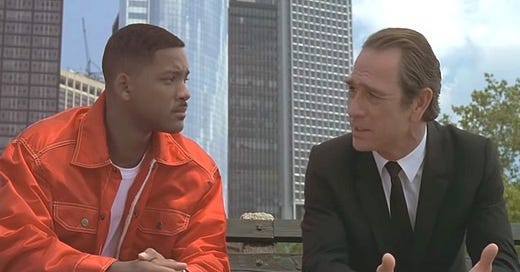The world, it often seems, continues to get stranger. In recent years, I have tried to adopt a mentality of curiosity. Rather than jumping to a conclusion, I try to let questions arise.
Try being the operative word. It takes practice to train your mind. And I know what yoda said, y’all. Sometimes I succeed in doing, and other times I fall short. And so I mean ‘try’ with all the might I can muster.
Hospitality presents curious situations on a daily basis. Most industries do, I would imagine. I’ve dabbled in others, so I can confirm that people are, as Agent K so eloquently put it, “...dumb, panicky, dangerous animals, and you know it.”
I worked with horses for a time, and as a teenager, one of my first jobs was as a kennel attendant at a local veterinarian’s office. I thought back then that working with animals would allow me a bit of respite from the world of people.
Wrong. People own animals. People make decisions that affect the lives of animals, and they don’t always make good ones.
Like many teens, I wanted to be a vet, and the veterinarian I worked for once asked why.
“Because I like animals, and I won’t have to work with people,” I said.
He kinda grinned. “You’ll have to work with people every day,” he countered.
My face fell.
“You can’t avoid people,” he reiterated. And there, as I was assisting him in removing a benign tumor from a cat’s neck, was my first glass shattering realization that I would just have to grit my teeth and deal with people for a while.
The next time I worked with animals was with the horses. Arabians and Saddlebreds, mostly. Horses are endearingly panicky. They’re huge, and their personalities range from dog to cat, depending on the situation.
If you walk at a certain angle to them, they’ll go where you want them to.
If you need to approach them directly, don’t make eye contact. Keep it casual.
If you enter a paddock full of fillies, they’re going to mess with you. Be prepared to be nipped. Horses are playful, skittish and particular.
People are much the same way. They behave differently alone than they do in groups. A bad idea can spread like wildfire. A good idea can turn sour with the wrong plan of action.
People are reactive, impatient and stubborn.
But more often than not, this is only the surface. If you are able to get curious and dig in a little, you can meet these reactive, impatient, stubborn folks on their level, which is often simply uneducated, which is to say, ignorant.
I don’t mean dumb, and I don’t mean unschooled.
I do mean they’re often in a new situation, outside their comfort zone, trying to navigate a world (menu) they don’t understand while trying to maintain control when they should trust their guide (server).
I work in a restaurant with a menu written in another language. Not entirely, of course. But when people come in, they often start with questions like, “what does this mean?”
You can feel the tension melt as you translate. You can tell when someone is anxious, and you can feel the moment of release when they relinquish their experience to you. You’ve got to allow them to ask questions, and you’ve got to make them feel like those questions are understandable.
After all, they are.
Back to horses. When you need to put a halter on a horse across the pasture, you sling the halter over your shoulder and pretend the horse doesn’t exist. You pace slowly out, letting the horse see that you’re looking over there, at that other thing, even though you’re walking in its general direction.
But the horse can see that you’re not staring it down, so it goes back to grazing. You turn your head to look at something over yonder, on the other side. While you turn your head, you take note of the horse’s general disposition upon noticing you.
If it trots twenty feet away, you adjust, but you don’t look directly at it.
This game of chase can be frustrating if the horse is particularly persnickety. The goal is that once you’re upon the horse, it submits to the idea that you happen to be there and happen to have a halter. In this ideal scenario, you gently slip the halter on and the horse follows your lead.
In the less ideal scenario, a game of indirect chase begins, and you get your steps in.
Like I said, the range is dog to cat. Easy going to high strung.
People are the same way. Sometimes they need to be chased. Other times, they’ll say, “what’s good?” and order whatever you recommend.
This comparison is not meant to disparage humanity as a whole. In no way do I mean to hold myself or what I do above the rest–in fact, I mean to do the opposite.
We forget that we are animals on a base level, and that, as advanced and intelligent as we are, we still have tendencies that connect us back to our origins, and to the rest of the animal kingdom. We are a part of it.
I think it’s important for us to have these conversations about our behavior, our patterns and our quirks. The things that make my job unpleasant are the same things that make your job unpleasant.
They’re also the things that can make your day and bring you joy.
They’re strange looking, bipedal, hairless, talking animals. Have a good week.



